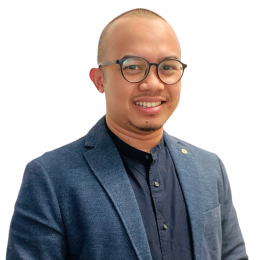Ilham Akhsanu Ridlo
Ilham Akhsanu Ridlo is an early-career researcher and assistant professor at the Faculty of Public Health, Universitas Airlangga in Indonesia. He is currently a Ph.D. student at Institut für Kommunikationswissenschaft und Medienforschung (IfKW), Ludwig-Maximilians-Universität München. Ilham believes that science communication is crucial in bridging the gap between research practice and health policy implementation. His research area is about how scientists and journalists influence decision-makers to understand scientific uncertainty in public health.
In addition to his daily responsibilities, he is actively involved in the Society of Indonesian Science Journalists (SISJ) as a non-journalists-member and contributes to pop-sci in The Conversation Indonesia and other media outlets. Recently, his team won a small global grant from The Global Network for Academic Public Health Program to fund a project on applying science communication to inoculate the public against vaccine misinformation.
Ilham’s doctoral project is titled “Communicating Science: A Collaboration Between Scientists and Journalists Covering the COVID-19 Pandemic in Indonesia.” His project focuses on improving the communication between scientists and journalists in covering the pandemic in Indonesia. The goal is to create a collaborative and constructive relationship between the two groups to enhance public understanding and trust in scientific information related to COVID-19.
About his Intersection of Health Policy, Science Journalism, and Science Communication
Indonesia is currently facing a dire situation in handling health crises, which cannot be separated from the catastrophic responses in the critical first three months of dealing with the pandemic. The failure was mainly caused by the lack of coherence in communicating policies to the public to curb COVID-19 infections.
Managing information during the pandemic is even more difficult as public spaces, like social media, are littered with disinformation and misinformation. Sometimes, controversy is started by “unofficial political buzzers” that the government relies upon to communicate policy. The Indonesian government’s communication strategy predominantly concerns information polarization between scientists, journalists, and politicians. Ilham believes that a combination of appropriate health policy and robust science journalism and communication is crucial to overcome this situation. He thinks that science journalism and communication can build bridges between science and health policy.
Research Interests: Health Policy; Science Journalism; Science Communication.
Selected publications
- Zein, R. A., Wulandari, R. D., Ridlo, I. A., Hendriani, W., Suhariadi, F., & Rianto, A. (2022). The Characteristics of Occupational Tuberculosis Risk in Healthcare Workers**.** The International Journal of Health Planning and Management. https://doi.org/10.1002/hpm.3489
- Rahvy, Aisyah, & Ridlo, I. A. (2020). How Does Islamic Organizations Respond to COVID-19 in Indonesia? A Case Study. Public Health and Preventive Medicine Archive. https://doi.org/10.15562/phpma.v9i1.274
- Ridlo, Ilham Akhsanu. “HOW HAS COVID-19 CHANGED THE WAY HOSPITALS DELIVER CARE?” Jurnal Administrasi Kesehatan Indonesia, vol. 9, no. 1, June 2021, pp. 1–3. e-journal.unair.ac.id, https://doi.org/10.20473/jaki.v9i1.2021.1-3.
- Megatsari, H., Akhsanu Ridlo, I., & Kusuma, D. (2021). High visibility of outdoor tobacco advertisements around health facilities in East Java, Indonesia: a geospatial analysis. Medical Journal of Indonesia, 1(1). https://doi.org/10.13181/mji.bc.204177
- Irawan, D.E., Abraham, J., Zein, R.A., Ridlo, I.A. and Aribowo, E.K. (2021), Open Access in Indonesia. Development and Change, 52: 651-660. https://doi.org/10.1111/dech.12637
- Ridlo, I. A. (2020). Pandemi COVID-19 dan Tantangan Kebijakan Kesehatan Mental di Indonesia. INSAN Jurnal Psikologi Dan Kesehatan Mental, 5(2), 162. https://doi.org/10/gjsp32
- Laksono, A. D., Ridlo, I. A., & Ernawaty, E. (2020). DISTRIBUTION ANALYSIS OF DOCTORS IN INDONESIA. Jurnal Administrasi Kesehatan Indonesia, 8(1), 29. https://doi.org/10/gjsp38
- Zein, R. A., Putri, N. K., & Ridlo, I. A. (2020). Do justice and trust affect acceptability of Indonesian social health insurance policy? International Journal of Health Governance, 25(1), 78–92. https://doi.org/10/gg89rx
- Megatsari, H., Ridlo, I., Amir, V., & Kusuma, D. (2019). Visibility and hotspots of outdoor tobacco advertisement around educational facilities without an advertising ban: Geospatial analysis in Surabaya City, Indonesia. Tobacco Prevention & Cessation, 5(October). https://doi.org/10/gjsp33
- Ridlo, I. A., & Zein, R. A. (2018a). Arah Kebijakan Kesehatan Mental: Tren Global dan Nasional Serta Tantangan Aktual. Buletin Penelitian Kesehatan, 46(1), 45–52. https://doi.org/10/gjsp6r
- Ridlo, I. A., & Zein, R. A. (2018b). #CondomEmoji: Are urban Indonesians receptive to a social media-based campaign for safer sex? Health Education, 118(5), 386–401. https://doi.org/10/gjsp6s



